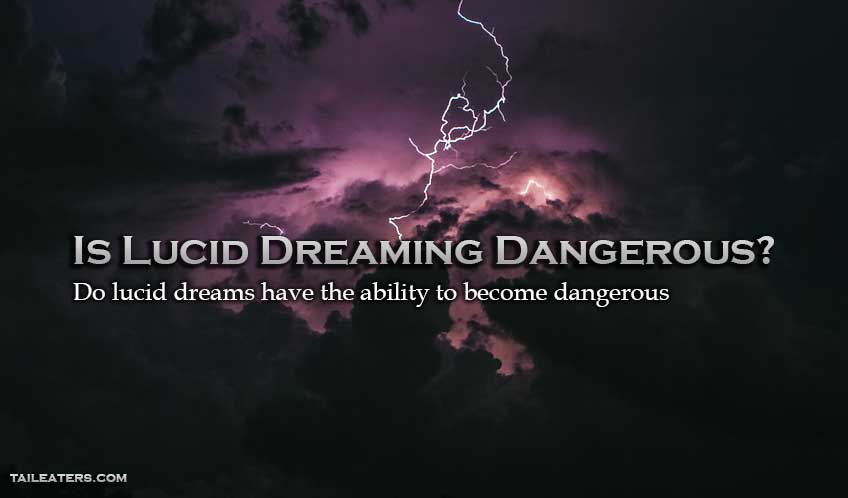
Is Lucid Dreaming Dangerous?
Over the years of using lucid dreams to explore my consciousness, I have often pondered the question: is lucid dreaming dangerous? I have learned that the short answer is no. The long answer is a bit more complicated and needs some explaining.
Lucid dreaming is a natural phenomenon that has been happening since the beginning of mankind. The ancient Egyptians wrote about dreams with the indication that they were aware while dreaming, and the Tibetan Buddhist have been using dream yoga (which is a form of lucid dreaming) in their practice for thousands of years.
Besides lucid dreaming being used as a tool for religious and spiritual means, lucid dreaming occurs naturally in many individuals throughout their life. Many people (including myself) were born with the ability to lucid dream and had been doing so all of their lives without any problems.

Lucid dreaming can also help individuals with PTSD and other traumas. Lucid dreaming has been used to help treat individuals with resiliency therapy and studies have shown its effectiveness.
So how do people get this idea that lucid dreaming is dangerous?
As seen in popular media, lucid dreaming is often betrayed in ways that are not possible which has produced some of the concerns surrounding lucid dreams. In the movie Inception, we see individuals hacking into other minds and leaving false memories to provoke individuals to change their habits without their consent. Though shared dreams and their possibility is still an ongoing debate, changing or influencing someone’s personal thoughts inside of a dream is not. Additionally, dying in a dream (which is also explored in movies) or even pursuing individuals personal desires is actually encouraged, and is a healthy way to express these sensations in a safe and conducive environment made by the dream experience.
Experiencing or experimenting with trauma in a dream state has been effective in my process to understanding the process of life and death and the realization that fear and my response to it is something that I can control. Understanding fear and mortality in dreams have made a positive impact on how I react to fear-inducing experiences as I get older.
Dreams, however, can have the ability to cause an individual to lose grasp on reality if that individual is not grounded in their waking reality. If someone is focused entirely on their dreams and using them as an escape to their life, this can cause issues to arise. This doesn’t make lucid dreaming dangerous, this is simply a person choosing to use the dreams as a means to not face reality, and anything, including lucid dreaming, can be that object of that escape for this person.
How to use lucid dreams correctly
If we look at history, we can see that there are ways that lucid dreaming has been used by societies to make long-lasting positive changes in their community.
Besides the Egyptians and Tibetans, dreams and lucid dreaming have been a large part of the Native American culture. In the book The Dream Seekers: Native American Visionary Traditions of the Great Plains we see how dreams and understanding big dreams were a big part of how their culture expressed their spirituality. We also know that shamanic traditions around the world used dreams as essential ways of discovering their spiritual relationship to the world around them. Mircea Eliade’s book Shamanism: Archaic Techniques of Ecstasy discusses this in great detail.

It seems to be that dreams and lucid dreaming were a much larger part of peoples culture than they are today, as with our current culture we are encouraged not to listen to our dreams and to ignore them as erroneous noise.
Dr. Rubin Naiman discussed with me how he sees that those cultures who adapted dreams and lucid dreams into their daily lives as essential aspects of their experiences in the waking world, not only improved their understanding of their place in their community but overall had less depression mental illness.
Overall it would seem that we should be paying more attention to our dreams both lucid and nonlucid, and move away from thinking of them as dangerous. Being too wrapped up in the waking world is what is dangerous – not the other way around.
Lee Adams is a Ph.D. candidate in Jungian Psychology and Archetypal Studies at Pacifica Graduate Institute and host of Cosmic Echo, a lucid dreaming podcast, and creator of taileaters.com, an online community of lucid dreamers and psychonauts. Lee has been actively researching, practicing, and teaching lucid dreaming for over twenty years.
Join the Discussion
Want to discuss more about this topic and much more? Join our discussion group online and start exploring your consciousness with others like yourself



Great article! I recently read a collection of Carl Jung’s work on dreams and found it absolutely fascinating. I’ve experimented with lucid dreams myself, and this improved my dream recall dramatically. These days I don’t concentrate as much on controlling the dream, but I do try to remember them and write them down. Since I’ve become more intentional about meditation and daily mindfulness, I’ve noticed my dreams have become much more vivid and elaborate. I always look forward to falling asleep these days 🙂
Kristian, Thanks for your comment. Jung has a great approach to understanding dreams and it’s great that you are finding that out. I am currently working on a guide to help others focus more on understanding the dream rather than forcing the experience of the dream much as you have discussed through your dream practice. Would enjoy talking with you about this if you had time. Come visit us on the discussion group if you get time.
I would enjoy that as well. I will certainly do that!